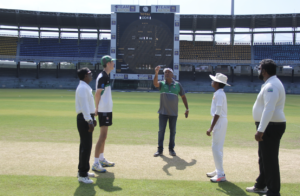Whether you’re a captain or not, you CAN be a leader in any team you play in.
This article is not going to teach you how to set fields, plan tactics or anything like that. I’ve taken 11 principles of great leadership from one of my favourite personal development books (Think & Grow Rich by Napoleon Hill) and applied them to cricket.
If you take them and apply them to your life, training and game - you’ll set a great example at your club.
I’m going to insert the principle as written in the book and then discuss how this principle applies to cricket and offer some examples;
1. UNWAVERING COURAGE
“Based upon knowledge of self, and of one’s job. No follower wishes to be dominated by a leader who lacks self-confidence and courage. No intelligent follower will be dominated by such a leader very long.”
Application To Cricket;
This principle means that you put your hand up in good times & bad, you do the jobs that others don’t want to do.
An example of this might be batting higher in the order on a tough wicket, continuing to get in behind the ball against a fast bowler after being hit or putting your hand up to bowl the last over.
2. SELF CONTROL
“The man/woman who cannot control themselves, can never control others. Self-control sets a mighty example for one’s followers, which the more intelligent will emulate.”
Application To Cricket
Self control in cricket is essential. Being able to battle the little inner demon that’s saying “hit this bowler for 6” when your team needs you to bat time or “try to get this batter out” when your team really needs you to focus on bowling dots or not reacting negatively to at an umpire after a poor decision.
Self control can also be show off the field by leaders. Leaders choose to train when they don’t feel like it, they choose to eat the right food and they choose self control over going out with friends the night before a game.
3. A KEEN SENSE OF JUSTICE
“Without a sense of fairness and justice, no leader can command and retain the respect of their followers.”
Application To Cricket
A great leader in cricket does not pick sides and they don’t have ‘favourites’. They don’t bat or bowl someone higher because they’re friends, it’s a neutral playing field and they make the right decisions for the team. They also take the time to understand both sides in team disputes.
4. DEFINITENESS OF DECISION
“The leader who wavers in their decisions, shows that they are not sure of themselves. They cannot lead others successfully.”
Application To Cricket
This principle means that you assess the information you have at hand, make a clear and decisive decision and then completely own your decision whether it works out or not.
An example of this could be deciding wether to bat or bowl, deciding what bowlers to bowl in a tough situation, setting fields. In any situation, leaders a clear and definite with their decisions.
5. DEFINITENESS OF PLAN
“The successful leader must plan their work, and work their plan. A leader who moves by guesswork, without practical, definite plans, is comparable to a ship without a rudder. Sooner or later they will land on the rocks.”
Application To Cricket
All great leaders in cricket have a clear plan for every situation. They’re students of the game.
Captains know their players and their roles and they have a plan for them. Captains know their bowlers and what fields to set for them. They also know their opposition.
Batters have a plan against every type of bowler they’re going to face and plans for different pitch conditions.
Bowlers have clear plans for different batters, different conditions and different stages of the game.
Remember - you don’t have to be a captain to be a leader or to have a definite plan.
6. THE HABIT OF DOING MORE THAN PAID FOR
“One of the penalties of leadership is the necessity of willingness, upon the part of the leader, to do more than they require of their followers.”
Application To Cricket
This is obviously a metaphor (most aren’t getting paid to play cricket) but a very important one if you want to be or act as a leader.
All great leaders do more than they ask of their players and more than what’s expected of them.
- They’re the first to arrive at training to help the coach set up
- They’re first to arrive at the game on match day to prepare
- They’re last to leave the dressing room because they were cleaning up
- They score, run drinks or whatever’s needed on match day
- They go out of their way during the week to do things the team or club require.
A great leader is doing extras when no-one is watching.
7. A PLEASING PERSONALITY
“No rude, untidy or careless person can become a successful leader. Leadership calls for respect. Followers will not respect a leader who does not grade high on all of the factors of a Pleasing Personality.”
Application To Cricket
Great leaders in cricket and sport get along with everyone. This doesn’t mean you have to be best mates with everyone but you do have to treat everyone with respect, empathy & kindness. Take the time to get to know teammates, coaches & club people.
8. SYMPATHY & UNDERSTANDING
“The successful leader must be in sympathy with his followers. Moreover, they must understand them and their problems.”
Application To Cricket
Rolling on from my last point above - a great captain or leader knows their teammates well. They don’t create ‘clicks’ in the team. They’re inclusive.
They also make the effort to understand and sympathise with teammates who are having a hard time.
An example of this might be - your teammate turns up to training or a game in a foul mood, is being short and quiet. Rather than write them off for being a grumpy person and ignoring them, or worse, fuelling the fire, you take the time to chat and understand their problem and find out they’re having issues at home.
9. MASTERY OF DETAIL
“Successful leadership calls for mastery of details of the leader’s position.”
Application To Cricket
This means that you know your position inside and out.
As a captain, you know your players, you know their roles, you know your opposition, you have plans for different situations and conditions and you’re reliable, punctual and organised.
As a batter or bowler - you know your strengths, you know your weaknesses, you know your physical capabilities and how to get the most out of them and you know the opposition you’re coming up against.
All of this doesn’t just happen - it takes time, it takes study, it takes constantly reviewing your game and it takes planning. Great leaders put the time and effort in.
10. WILLINGNESS TO ASSUME FULL RESPONSIBILITY
"The successful leader must be willing to assume responsibility for the mistakes and shortcomings of their followers. If they try to shift this responsibility, they will not remain the leader. If one of their followers makes a mistake, and shows themselves incompetent, the leader must consider that it is they who failed.”
Application To Cricket
Great captains and leaders take full responsibility for everything that happens out on the cricket field.
They don’t point fingers at the end of the days play. A simple ‘tell tale’ sign of whether a player is a great team player and leader or a selfish individual & dictator is they use the word “we” more often that the word “I”.
If there’s a batting collapse instead of saying “I scored 50 but the rest of you did nothing”, they say “We didn’t do the the job out there collectively today guys, what do we need to improve on”
11. COOPERATION
“The successful leader must understand, and apply the principle of cooperative effort and be able to induce his followers to do the same. Leadership calls for POWER, and power calls for COOPERATION. There are two forms of Leadership. The first, and by far the most effective, is LEADERSHIP BY CONSENT of, and with the sympathy of the followers. The second is LEADER- SHIP BY FORCE, without the consent and sympathy of the followers.”
Application To Cricket
If you’re a captain or leader of your team, you need to get buy in from the rest of your teammates. Otherwise you won’t go very far. To gut buy in, you need to include them in the decision making process.
Instead of standing up the front barking orders - “I want us to do this”, “I think we should do that”, “You did this wrong”, “You need to work on that”.
Sit with your group and ask questions like - “”How do WE want to play today?”, “What’s OUR plan?”, “What did WE do wrong that we need to improve?”.
At the end of the day the final decision comes down to the captain or the leader but if the captain includes players in the decision making, they’re get a lot better buy in and cohesion.
Article Author: Nick Fitzpatrick
Co Founder of Australian Cricket Institute & Brisbane Premier League



